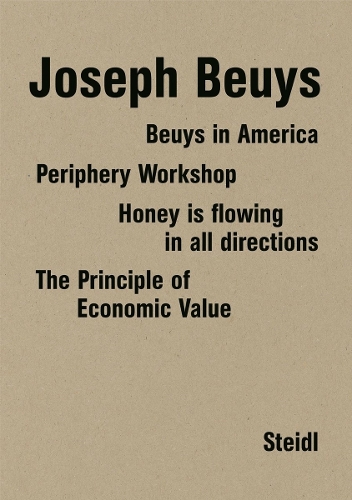
Joseph Beuys: Four Books in a Box
(Hardback)
Publishing Details
Joseph Beuys: Four Books in a Box
By (Author) Klaus Staeck
By (author) Gerhard Steidl
Steidl Publishers
Steidl Verlag
22nd November 2022
10th November 2022
Germany
Classifications
General
Non Fiction
Photographic equipment and techniques: general
Individual artists, art monographs
709.2
Physical Properties
Hardback
600
Width 220mm, Height 320mm
4370g
Description
Four Books in a Box offers an insider's view of some of Joseph Beuys' most original works and celebrates the extraordinary 18-year collaboration between Beuys, Klaus Staeck and Gerhard Steidl. German political graphic artist Staeck started working with Beuys as early as 1968, publishing the artist's postcards, posters, screen-prints and multiples. In 1972 Steidl began printing and producing Beuys' editions for Staeck. Staeck and Steidl furthermore installed the artist's exhibitions and documented in photos and video many of his lectures, workshops and performances - on art, life, and "social sculpture," Beuys' theory that everything is art and everyone an artist. Each volume in this boxed set explores a specific Beuys project: his infamous visit to America in 1974, his installation Honeypump in the Workplace at documenta 6 in 1977, the Periphery Workshop at documenta 6, and the inaugural exhibition of Wirtschaftswerte (Economic Values) at the Museum of Fine Arts in Ghent in 1980. Revealing the artist in full showman mode alongside more private moments, Four Books in a Box is a comprehensive look at Beuys the person and persona from those who knew him best. To be a teacher is my greatest work of art. - Joseph Beuys
Reviews
As an object it is also earthy. There is not a hint of gloss in its sturdy case, fabric covers, and mostly black and white pages. As the hand passes over the pages, one feels its presence, its thingness, its physical presence in the physical universe.--Eugene Rabkin "StyleZeitgeist"
Author Bio
Widely regarded as one of the most influential artists of the twentieth century, Joseph Beuys (1921-86) was a sculptor, draughtsman, action and installation artist, as well as a teacher, politician and activist. After serving as a soldier in World War II, experiences that would strongly shape his practice, he studied sculpture at the Kunstakademie Dsseldorf, where he was made professor in 1961. From the early 1960s Beuys dissolved the difference between his biography and art, and increasingly employed his persona and charisma in what he deemed art's ultimate purpose: to radically democratize society. He called for the adoption of his universalist conception of art as a creative, transformative force within politics, science, philosophy and economics. Now as then, Beuys exerts a palpable influence upon artistic and political discourse.
